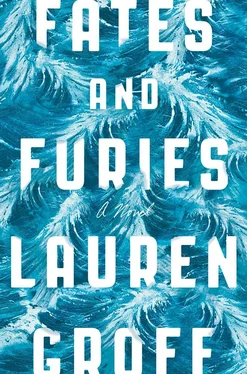How strange it felt to Lancelot to see someone else being lifted on a creative crest.
He thought of the hours and hours he’d spent carried along and how utterly silly he might have looked had anyone at all peeped in and seen him. First in the windowless closet they’d converted to his study in the city, and then, in the country house, in his glossy attic study, with the Shakespeare compendium on its prayer stand and the gardens in the window, Mathilde moving among them. For many months up there he had looked down and considered how the lifespan of a sunflower reflected the lifespan of man: hopeful, beautiful, brightly shooting out of the ground; broad and strong, with a face turned full and dutiful toward the sun; head so heavy with ripe thoughts it bowed toward the ground, turned brown, lost its bright hair, grew weak on its stalk; mowed down for the long winter. He’d spoken in voices, strutted, cringed, marched, minced up there. Eleven major plays, two additional probably not so major, in retrospect, and he’d performed all of them as he wrote them, to blank walls, then the audience of sunflowers and Mathilde’s slim back bending toward the weeds below.
He came to when he saw Leo buttoning up one of his shirts, putting on his sweater, then his jacket, sliding moccasins over his feet. He walked around to the road and headed toward the boy’s front door, calling out to him as Leo came out and fiddled with the lock.
“Oh, hullo,” Leo said. “Have you come to find me? I’m so glad. I’m feeling rather guilty about you. I had planned to wrap up early and talk over our project, but the composition I was working on rudely insisted that I stick with it to the bitter end. We’re off to supper, then? We can talk as we walk, perhaps.”
“Let’s go,” Lancelot said. “I have a million ideas. I’m boiling over with them. I had to go for a walk to get away from them, but the problem with ideas is that the more you walk, the more you get. They breed in the brainpan.”
“Brilliant,” Leo said. “Glad to hear it. Go ahead and spin.”
By the time they sat at supper, Lancelot had gone over his top five. Leo was frowning, pink from the cold. He passed the roasted vegetable torte, then said, “No. None of those, I think. I wait for the spark, you see. And those ideas don’t have the spark, I’m afraid.”
“All right,” said Lancelot, and he was about to launch into the next five when he felt a hand on his shoulder and a voice hot in his ear saying, “Lotto!” and he looked up at first uncomprehendingly at Natalie. Natalie! Of all people! Natalie of the potato nose over the thin black moustache. She had done well in the Internet boom, but apparently had cashed out her stock and was so rich she could return to what she loved most. Which was — how very unexpected— sculpture , of all things. She was white with plaster dust and heavier; well, they all were heavier. Fine etchings around her eyes, which were still so strangely resentful. There was lots of hugging, lots of celebration, Natalie sitting beside Lancelot and filling him in on life. But when Lancelot turned to introduce Natalie to Leo, Leo had already bussed his plate and utensils, and had vanished, leaving an apologetic note in Lancelot’s mailbox: he was under pressure to get this commission done, could concentrate fully on the opera when he was finished. So very, very sorry. His handwriting as tiny and precise as typescript.
—
AND THEN THE ENDLESS APOLOGIES. Four days in a row: “I know, I know, it’s terrible, Lancelot, I’m so horribly sorry, but I really must get this commission done. It’s killing me, in fact.” Leo’s face flaming as soon as he saw Lancelot, a new nervousness borne out of shame. Whenever Lancelot staked him out, watching in the woods through the windows, the boy was working, feverish and writing; and because he wasn’t faffing about or napping or scratching himself like a sloth, Lancelot couldn’t resent him, which only made the wait more difficult.
Down in the cubby in the basement laundry room of the colony house, where he had to telephone Mathilde — no cell service here, they were truly removed from the world — he vented his frustration in a whisper. She made cooing sounds, husky noises of support, but it was five in the morning, she wasn’t at her best. “How about some telephonic kink?” she said at last. “A little sultry-sultry across the wires? Calm you down a bit.”
“No, thank you,” he said. “I’m too distressed.”
A long, long pause, her breath at the other end. “This is bad, isn’t it,” she said. “This new crisis. I’ve never known you to pass up a little phone sex.” She sounded sad.
He missed her, his wife. It felt strange to wake up without needing to bring her milky coffee every morning. He felt the lack of the tiny cares she took for him, the way she laundered his clothes, the way she trimmed his eyebrows. Part of him, here, was lacking.
“I want to be home with you,” he said.
“Me too, my love. So come home,” she said.
“I’ll give it a few more days,” he said. “Then the booty call in the dark of the night.”
“I’ll be beside the phone,” she said. “Breathlessly waiting. I’ll keep the keys in the ignition.”
After dinner that night, he went with a clump of artists through the woods, flashlights spearing the black, to the German sculptors’ studio. A three-story building with a removable side and a hydraulic lift for the heaviest art. There was vodka chilled in the stream in back and a sort of seething music, all electric spikes. The lights had been turned off. In the front room, a two-story flutter, love notes from the German Frau ’s first marriage barely tethered to a structure so it shifted in the wind, one tiny home movie projected on each. A sculpture of marriage, marriage come alive.
Lancelot felt tears start to his eyes. It was so exactly right. The Germans saw the gleam, and both of them — like budgerigars on their perch — sidled up and hugged Lancelot around the waist.
—
ON THE FIFTH DAY of artistic stymie, Lancelot woke to a miserable drizzly dawn and took a bike and coasted down the hill to the town gym’s pool.
The water made everything better. He was not a good swimmer, but the thrashing helped, and he spent longer and longer with each lap just gliding underwater. It washed over him, calmed him, brought him back to where he had been in the car, coming to the residency. Perhaps it was the oxygen depletion. Perhaps his rangy body had finally gotten the exercise it needed, especially in light of his enforced celibacy. Perhaps, only, he had exhausted himself to the point where his anxieties had fallen away. [False. He should have known a gift when he saw one.] But when he came to the end of the pool, touched the wall, pulled himself up, he knew what the opera would be. It rose before him, gleaming, more real than the water it overlay.
He sat so long at the end of the pool, having forgotten himself, that his skin was dry when he looked up to see Leo standing beside him, still in his jeans and white button-down and moccasins. “They’d told me you were down here splashing about. I’ve come to fetch you in a little car I’ve borrowed. So sorry to keep you waiting for so very, very long, but you know it means that we’re both keen to begin. If it is convenient for you, I’m ready,” Leo said. He moved, and at last his face, which had been silhouetted by the sun coming directly through the window, was visible.
“Antigone,” Lancelot said, and smiled up at him.
“Sorry?” Leo said.
“Antigone,” Lancelot said. “Spark.”
“Antigone?” Leo said.
“Antigone, underground. Our opera. Antigone who hadn’t hanged herself, or she had tried, but before she succeeded, the gods had cursed her with immortality. First they gave it as a gift, for hewing to their laws against those of men. And then, when she railed against the gods, it turned into a taunt. She’s in her cave still, even today. I was thinking of the Cumaean Sybil, who lived for a thousand years, so long that she shrank and was put in an urn. Eliot quoted it as epigraph for ‘The Waste Land,’ from Petronius Arbiter’s Satyricon , ‘For once I saw with my own eyes the Cumaean Sibyl hanging in a jar. When the boys asked her, “Sibyl, what do you want?” she said, “I want to die.” ’”
Читать дальше












